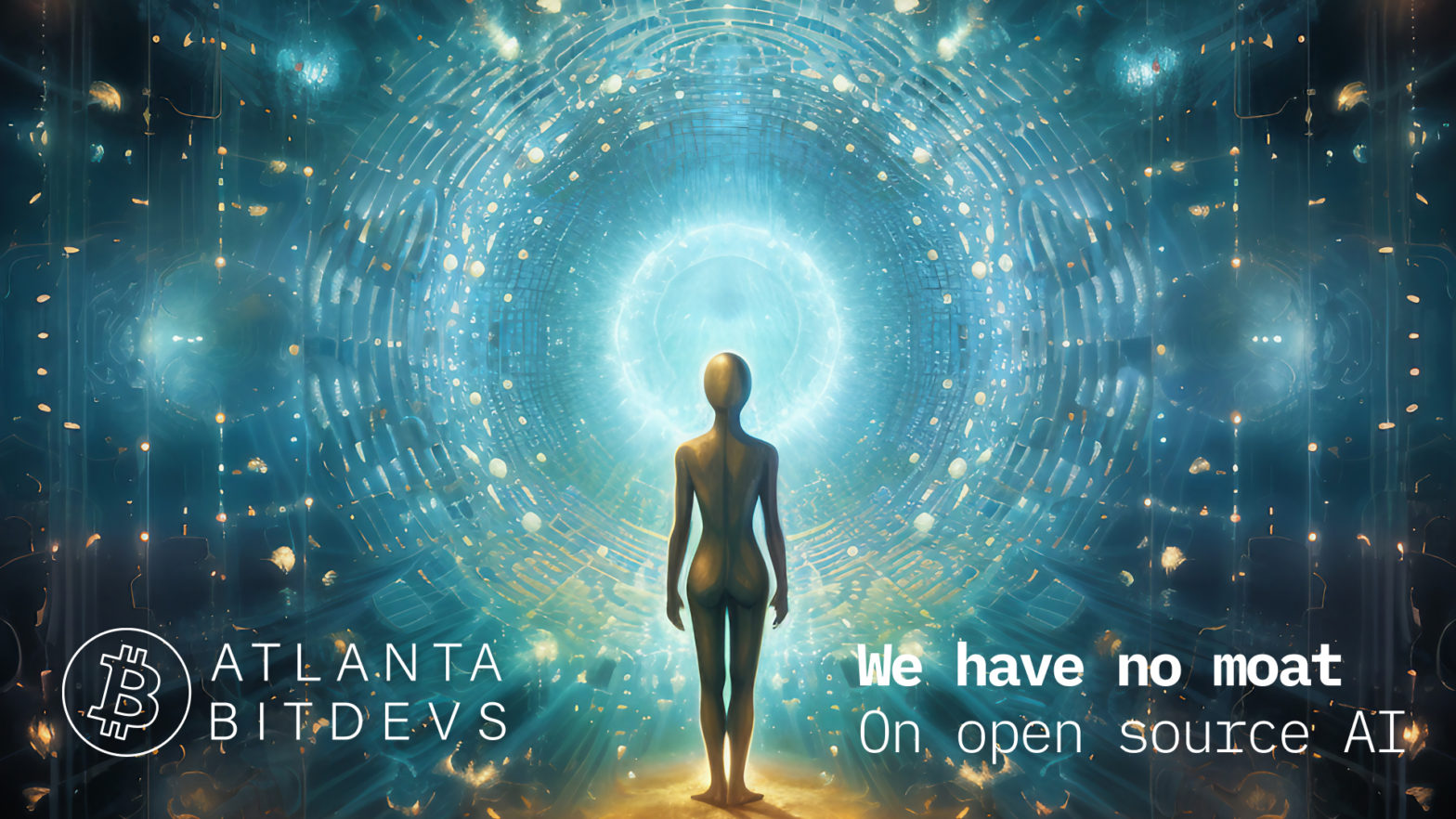This session’s topic is the leaked Google memo “We Have No Moat”. This document outlines the power of open source AI models and how businesses might stay competitive in the AI market.
While this isn’t a bitcoin focus paper, it is timely and relevant considering that the AI4ALL hackathon just launched. This hackathon has a clear focus on integrating bitcoin and lightning into AI applications. This document should help prepare your thinking for participating in this hackathon! Or if you don’t like to hack, it will at least be an interesting and fun conversation.
For those who many not have time to read the full paper, here is a summary provided by ChatGPT.
Techie Summary
Me: Can you summarize the keypoints of this article?
ChatGPT: The blog post “We Have No Moat” discusses how open-source AI development is outpacing both the author’s organization and OpenAI, particularly in areas such as language learning models (LLMs).
Key points include:
- The Rise of Open-Source AI: Open-source AI development has rapidly advanced, solving many “major open problems” in the field. People are running foundation models on mobile devices, fine-tuning personalized AI models on laptops in an evening, and freely sharing models with no restrictions. The quality gap between corporate and open-source models is closing fast.
- No Secret Sauce: The author’s organization and OpenAI lack a competitive edge over open-source AI, as these projects are quicker, more versatile, and generally more capable. The organization’s best hope is collaboration with the broader community.
- Leak of Meta’s LLaMA Model: An open-source foundation model from Meta was leaked to the public, resulting in a wave of innovation. Variants of this model were quickly developed, showcasing the reduced barrier to entry and power of collective development.
- Lessons Missed: Several innovations, such as LoRA (Low Rank Adaptation), which allows for model fine-tuning at a fraction of the cost and time, were not adequately considered by Google. Furthermore, the blog suggests that training smaller models and iterating them quickly could be more beneficial in the long run than training larger models from scratch.
- The Impact of Data Quality Over Quantity: Projects that train on small, highly curated datasets often save time and show promising results. This approach contradicts traditional data scaling laws.
- Direct Competition with Open-Source is a Losing Game: With the rise of open-source AI, there’s little incentive for customers to pay for restricted Google products. Open-source development holds advantages, like breadth of research and individual freedom from licenses, which cannot be replicated by corporations.
- Importance of Ecosystem Ownership: The blog post highlights how Meta benefited from the leak of their model, as most open-source innovations build upon their architecture. This positions Meta to incorporate these advancements directly into their products, underlining the value of owning the ecosystem. The author suggests that Google should similarly aim to own and control the ecosystem.
Non-techie Summary
Me: Thanks! This works well for somebody who is familiar with tech. Could you summarize again in a way that’s about half the length, and geared towards an adult who is interested in tech, but doesn’t follow the AI industry closely and may not be familiar with AI industry jargon?
ChatGPT: Sure, here’s a simplified summary:
The blog post, “We Have No Moat,” discusses how people working on AI in their own free time or in smaller, more open groups are moving ahead of big organizations like the writer’s own and OpenAI.
Key points include:
- Open-Source AI Rising: These open-source, or publicly accessible projects, are making great strides in AI technology, even allowing people to run advanced AI models on everyday devices like phones and laptops.
- Big Organizations Losing Edge: The author admits that big organizations like theirs and OpenAI don’t hold a significant advantage over these open-source projects anymore. They suggest collaborating with the broader community.
- Power of Collective Development: A powerful AI model from the company Meta was made public, and this sparked a wave of innovation as people around the world built upon it.
- Fast Improvements on Smaller AI Models: The author suggests that creating smaller AI models and improving them quickly could be more effective than spending a lot of time and resources on creating larger models from scratch.
- Quality of Data Over Quantity: Projects using smaller, carefully selected sets of data are saving time and showing promising results.
- Open-Source Outpaces Big Organizations: With the rise of open-source AI, it’s difficult for big companies to compete. The open-source community holds advantages that big companies can’t match, like a wide range of research and individual freedom.
- Importance of Controlling the Ecosystem: The author emphasizes how Meta benefited from the open-source work based on their AI model, suggesting that controlling the platform where this innovation occurs can be very valuable.

